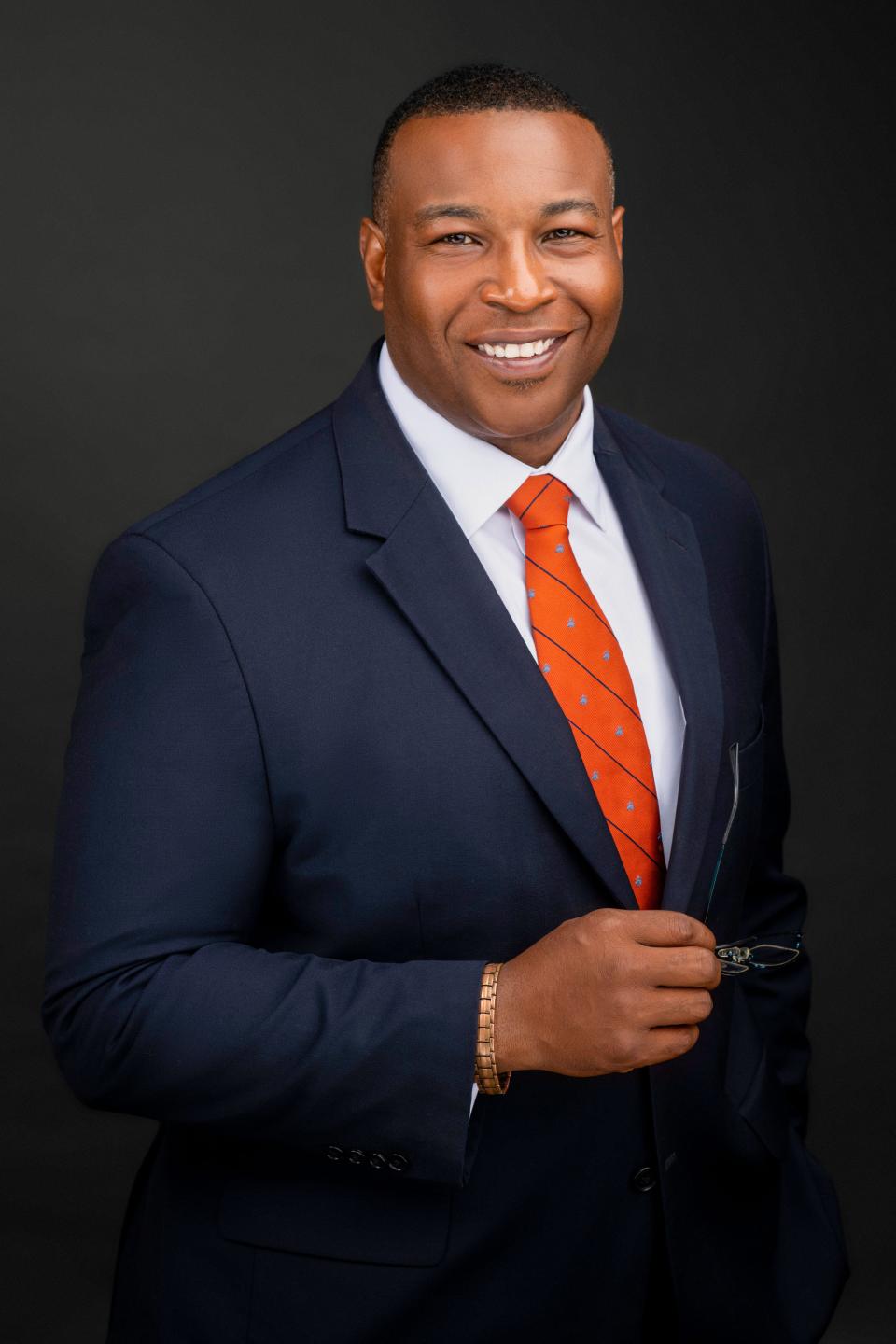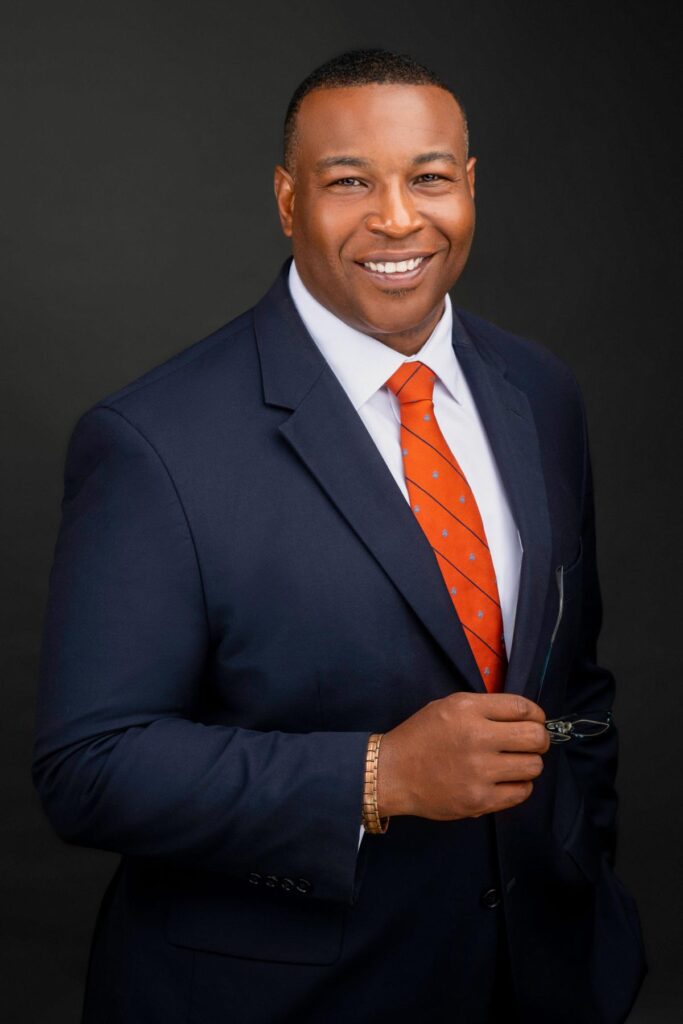Christopher Middleton, a Savannah defense attorney and lifelong Savannahian, is taking a step up to run for Chatham County Superior Court Judge.
In the nonpartisan race held on May 21, Middleton is running against Frank Pennington, an assistant U.S. Attorney. Superior Court judges are elected to four-year terms, and judges John E. Morse Jr. and Lisa Colbert are up for reelection this year. Penny Haas Freesemann is retiring at the end of this cycle.
Middleton graduated from Savannah State University in 2002 with dual bachelor’s degrees in mass communications and English literature and language, before graduating from the University of Vermont Law School in 2006.
From 2006 through 2015, Middleton worked in the Eastern Judicial Circuit Public Defender’s Office, serving as a general trial team member, senior trial team leader and major crimes division attorney. In 2016, he was promoted to Felony Division Chief and he briefly served as the Interim Public Defender. In 2017, Middleton founded the law firm, Cox, Rodman & Middleton. Since 2018, Middleton has served as Judge Pro Tem in Chatham County’s Recorder’s Court and Juvenile Court. Middleton also serves on various community boards, as chairman for Deep Center, the executive committee for the Savannah Bar Association, and board member for the Safety Valve Project.
As of April 22, Middleton has raised about $34,000, and spent nearly $1,500. Pennington, meanwhile, has raised more than $96,000, while spending nearly $50,000.
In an interview, Middleton discussed his vision should he win the race, centering a platform around reviewing the accountability courts and reducing the court backlog.

More: Assistant U.S. attorney Frank Pennington launches bid for Chatham County Superior Court Judge
More: Q&A: Chatham Co. Superior Court candidate Frank Pennington talks about why he’s running
More: Chatham DA faces Democratic challenger at forum hosted by League of Women’s Voters
This interview has been edited for length and clarity.
What platform are you running on?
“My platform is servant leadership. My platform is restorative justice. When I look at the Superior Court now, what we have are amazing judges. The question then becomes: where does my skill set fit in? What can I bring to the equation, and how can I make the Superior Court better as a force multiplier?”
What would you do to fulfill those guiding principles?
“We’ve got to look at the Accountability Courts we have. We’ve got veterans court, mental health court, and we have drug court. Those are the courts that have the most direct impact in regards to restorative justice, making sure that individuals have access to counseling and resources needed to eliminate or reduce the recidivism issue. What we find is that when you give people the assistance, you give them the resources, then they’re less likely to find themselves back into a situation where they’re justice-impacted.
On the other hand, servant leadership goes back to your dedication and your commitment to this community. I think when you look at my track record, you can say, that for over two decades, I’ve been in this community operating in a capacity of a servant leader, a nonprofit board member, Citizen Advocacy, Deep Center, Hodge Memorial daycare, the list goes on and on, the Savannah-Chatham Housing Authority. These are all parts of the organization that represents communities in our greater community. And so, it’s important for me to be a part of that. I think that knowledge, when you implement that, and you plug that into the equation, that’s how we get a stronger court system.”
You are a lifetime defense attorney, and you’re running against a lifetime prosecutor. For those with concerns that you’d side with the defense attorney rather than the prosecutor, how do you address those concerns?
“For about 10 years of my life, I have been operating in the capacity of a defense attorney, which is to uphold the principles of the Constitution, zealously advocate for my clients and operate in the best interests of my clients. That comes with a lot of work and a lot of investigation, breaking down cases. But most importantly, I’ve been able to connect with my client, being able to connect with my clients’ families, and address the rule of law. So, that’s one aspect of it.
The other aspect of it is, well, I’m also a pro tem judge. So I’ve been doing that in juvenile and recorder’s court for five years. I’ve been in positions where I’ve ruled against defense attorneys. in my capacity as judge. I’ve been in positions where I’ve ruled against prosecutors in my capacity as judge. Because at that point in time, what is the most important thing is the rule of law. That is the most important thing. The rule of law is the thing that governs, so it wouldn’t be an issue what your background and experience is, especially in an elected position.
One thing my colleagues do know is that I’m fair. I’m professional.”
What challenges do you see that make you want to run right now? And, to follow up on that, what would you implement on day one?
“That’s a tricky conversation to have. What I don’t hear a lot of people really saying is, step one would be to have the conversation. Step one would be to meet with the superior court judges, to see what systems work. Step one would be to meet with the staff to see what processes work. Go out and gather intel, get that information, and then have a courageous conversation about the things that don’t work, and then start talking about how we can implement ideas and structures and processes to address the issues that don’t work.
Now, where step one leads to? That’s another conversation.
Let’s see what Atlanta is doing. How is Atlanta addressing the same issues that we have? Or how did Atlanta address the same issues two decades ago? How did they solve those problems and see if we can implement them here at Chatham County.
We know some of the issues. The number one is going to be the backlog. We can say, ‘Let’s go in and look at the system and let’s upgrade the systems.’ But do we really know what the systems are? Are the systems really the issue? Or is the issue that we only have six Superior Court judges? When I was at Savannah State University, we had six superior court judges, and that was in 1996. This is 2024. The population was about 150-160,000 in 1996. Population now in 2024 is over 300,000. So we start talking about issues of backlogs, there’s a whole lot of variables that we could dissect. But once again, we got to have that initial conversation.
I can tell you a lot of what I’ve heard on the campaign trail. I can tell you a lot about what civil attorneys have been communicating with criminal attorneys. Backlog is one of the issues. It’s taking an extraordinary amount of time to make motions on civil cases and move cases along has been an issue. You have some citizens that feel like the programs offered by the court systems that they’re not being admitted to. It’s been an issue. So, we have lots of different issues that are communicated by citizens and by attorneys throughout Chatham County. But once again, we got to have that first initial conversation before we could put things in its proper place.”
Drew Favakeh is the public safety and courts reporter for Savannah Morning News. You can reach him at AFavakeh@Savannahnow.com.
This article originally appeared on Savannah Morning News: Defense attorney Chris Middleton talks about why he’s running for judge



